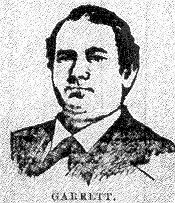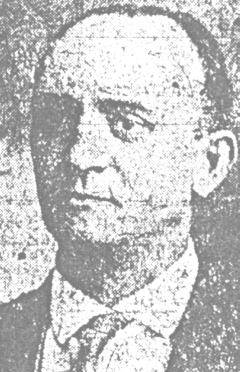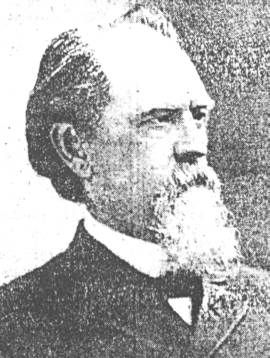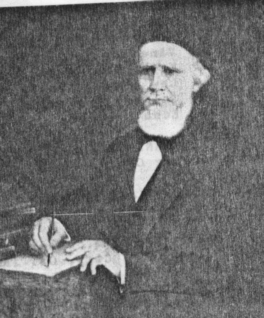Early Settlers -G-
Galphin, John and George, were the first settlers to Davisboro, locating their homes along the Ogeechee River in 1785. Ref: A History of Washington County by Washington County Historical Society.
 Garnett, W. J. (left), senior member of Atlanta City Council, was born in South Carolina but was raised in Campbell County. His business career began with a clerkship at a small salary in a store in Griffin in 1846. Then he opened a country store in Campbell County. Ref: The Constitution, Atlanta 1/10/1886
Garnett, W. J. (left), senior member of Atlanta City Council, was born in South Carolina but was raised in Campbell County. His business career began with a clerkship at a small salary in a store in Griffin in 1846. Then he opened a country store in Campbell County. Ref: The Constitution, Atlanta 1/10/1886 George, William LG 21 Sept 1784. Oglethorpe County Deed Book D, p. 21, 24.
Gheesling, Fleming (1811-1875) lived in Warren County. He is buried on the old Gheesling homeplace, near the New Providence Church, in Warren County.
Gholson, Nathaniel came from North Carolina to Madison County, Georgia. Ref: Memoirs of Georgia
Gibbons, Joseph lived at Mulberry Hill in Chatham County. Ref: LWT of Hannah Gibbons, Chatham County, 1796.
Gilham, Charles LG 400 acres originally in Wilkes County (now Oglethorpe, survey and land Grant. Oglethorpe Deed Book D, page 412.
Gillaspy, James. Survey dated 7 April 1784, 200 acres. Oglethorpe County Deed Book B, page 294.
Gilmer, Thomas Meriwether settled on the Broad River, where he died in 1817. Ref: Roster of Revolutionary War Soldiers in Georgia by McCall. Gibson, Randolph LG 250 acres 25 Nov 1788. Oglethorpe County Deed Book D, page 32.
Gilmore, James M., born 11/13/1755 in Cumberland County, N. C., died 1-3-1835 in Washington County, buried in the Gilmore Cemetery, near Warthen. He married on 6-6-1780 Mary Hughes (9/8/1766-12/6/1850). Ref: A History of Washington County by Washington County Historical Society.
Glass, Joel bounty warrant surveyed 10 June 1784, granted 12 October 1785 by Gov. Samuel Elbert, Book JJJ, folio 84. Oglethorpe County
Golden, Anny was bequeathed land in Henry County by Elisha Palmore's LWT dated 1829, Lincoln County.
 Golden, J. T. (left) was b. in Girard, Alabama on 12/19/1866, the son of F. S. Golden. He removed to Atlanta with his parents in 1870, ultimately becoming a blacksmith for the Western and A tlan tic Shops for manv years. His father, F. S. Golden, served as a soldier in the Confederate army throughout the entire war. Ref: Atlanta Georgian, 6/13/1908.
Golden, J. T. (left) was b. in Girard, Alabama on 12/19/1866, the son of F. S. Golden. He removed to Atlanta with his parents in 1870, ultimately becoming a blacksmith for the Western and A tlan tic Shops for manv years. His father, F. S. Golden, served as a soldier in the Confederate army throughout the entire war. Ref: Atlanta Georgian, 6/13/1908. Golding, William lived on Soap Creek in Lincoln County in 1786, where he received a headright grant.
Goodall, William P. was b. 1842 in Georgia, d. 3/1888. He was a bank clerk in Macon and lived in the prominent Flood House Hotel in 1850. He invested in many lands which he considered "wild " because they were not under cultivations, located in various Ga. counties, even though he lived in Macon. In Ware County, he owned 6860 acres; Clinch County, 2450 acres; Berrien County, 1470 acres; Wayne County, 1450 acres; Pearce County, 490 acres; Irwin County, 490 acres; Coffee County, 490 acres; Pulaski County, 202-1/2 acres; Millen County, 500 acres; Lumpkin County, 40 acres; Gilmer County, 160 acres; and 4 lots in Talbot County, Georgia. The grandmother of William Goodall was in the Graduate Class of 1850 at Wesleyan Female College, a young woman 17 years old.
Goodrich, Russell of Augusta was named in the LWT of Catherine Miller, of Dungeness, Cumberland Island (her LWT dated 1813 Camden County).
 Gordon, John B., General was b. 7/6/1832 Upson County, Ga. He was a soldier, statesman and loyal friends of the South and of the Union after the war. He graduated from the University of Georgia as head of his class in 1852. He studied and practiced 1aw in Atlanta with his brother-in-law, Judge Logan E. Bleckley, but preferred mining operations with his father and up until the war was actively engaged in it. In 1853 General Gordon m. the daughter of Congressman Hugh A. Haralson. During the war he recruited and commanded a company of mountaineers, called "Raccoon Roughs". "So eager was Sordon and his men for active service that they traveled all the way to Montgomery to the seat of action, and were at once attached to the Sixth Alabama. After a brief campaign in that section, they were sent to Virginia, the great theater of the war....There Gordon and his men found fighting in plenty and plunged into the thick of it with eagerness. A writer says that the chance of Gordon's promotion then was about one in a thousand. Hundreds of West Pointers stood waiting for promotion, and others with political `pulls' were insisting on appointments. But Gordon steadily rose by sheer merit of military genius and bravery in every action." It is a fact not generally known but at Sharpsburg;, General Lee sent him to bold a difficult position, requesting c,ordon to hold it as long as possible. "General, I pledge you to hold it until the sun goes down." Atlanta Georgian, 5/24/1907. "It was the zone of merciless fire, but throughout the long day Gordon stood steadfast. Rullets plowed their way four times through leg, arm and shoulder, but Gordon, weak from agony and loss of blood, stood and urged his men to hold. Then a 7linie ball s truck him in the face and he fell senseless. Ru t when the sun sank behind the horizon his men still held the position." After the war, General Gordon returned to Atlanta, becoming delegate at large to the national Democratic convention in 1868: was elected Governor, but counted out. In 1873, be was elected to the U. S. Senate; re-elected in 1879. He resigned in 1880 to build the Georgia Pacific railroad. In 1886 he was elected Governor of Georgia, serving two terms. In 1890, he returned to the Senate. His announcement for Governor was made in the lobby of the Kimball House in Atlanta, where, that evening, were assembled a great crowd of Confederate Veterans. After the supper, about 8 p.m., they were all gathered in the rotunda of the hotel, boiling with enthusiasm. It was then that the crucial moment came. Melville Dwinell, owner and editor of the Rome Courier, a Confederate veteran, was on the second floor at the railing, looking down upon the crowd. All at once, he yelled: "Gordon! Gordon for Governor!" The effect was electrifying. Their was a loud rebel yell by the veterans. General Gordon d. 1/11/1904 in Boynton, Florida. His Reminiscenses of the Civil War is a very comprehensive study and valuable work. Ref: Atlanta and Its Environs.
Gordon, John B., General was b. 7/6/1832 Upson County, Ga. He was a soldier, statesman and loyal friends of the South and of the Union after the war. He graduated from the University of Georgia as head of his class in 1852. He studied and practiced 1aw in Atlanta with his brother-in-law, Judge Logan E. Bleckley, but preferred mining operations with his father and up until the war was actively engaged in it. In 1853 General Gordon m. the daughter of Congressman Hugh A. Haralson. During the war he recruited and commanded a company of mountaineers, called "Raccoon Roughs". "So eager was Sordon and his men for active service that they traveled all the way to Montgomery to the seat of action, and were at once attached to the Sixth Alabama. After a brief campaign in that section, they were sent to Virginia, the great theater of the war....There Gordon and his men found fighting in plenty and plunged into the thick of it with eagerness. A writer says that the chance of Gordon's promotion then was about one in a thousand. Hundreds of West Pointers stood waiting for promotion, and others with political `pulls' were insisting on appointments. But Gordon steadily rose by sheer merit of military genius and bravery in every action." It is a fact not generally known but at Sharpsburg;, General Lee sent him to bold a difficult position, requesting c,ordon to hold it as long as possible. "General, I pledge you to hold it until the sun goes down." Atlanta Georgian, 5/24/1907. "It was the zone of merciless fire, but throughout the long day Gordon stood steadfast. Rullets plowed their way four times through leg, arm and shoulder, but Gordon, weak from agony and loss of blood, stood and urged his men to hold. Then a 7linie ball s truck him in the face and he fell senseless. Ru t when the sun sank behind the horizon his men still held the position." After the war, General Gordon returned to Atlanta, becoming delegate at large to the national Democratic convention in 1868: was elected Governor, but counted out. In 1873, be was elected to the U. S. Senate; re-elected in 1879. He resigned in 1880 to build the Georgia Pacific railroad. In 1886 he was elected Governor of Georgia, serving two terms. In 1890, he returned to the Senate. His announcement for Governor was made in the lobby of the Kimball House in Atlanta, where, that evening, were assembled a great crowd of Confederate Veterans. After the supper, about 8 p.m., they were all gathered in the rotunda of the hotel, boiling with enthusiasm. It was then that the crucial moment came. Melville Dwinell, owner and editor of the Rome Courier, a Confederate veteran, was on the second floor at the railing, looking down upon the crowd. All at once, he yelled: "Gordon! Gordon for Governor!" The effect was electrifying. Their was a loud rebel yell by the veterans. General Gordon d. 1/11/1904 in Boynton, Florida. His Reminiscenses of the Civil War is a very comprehensive study and valuable work. Ref: Atlanta and Its Environs.  Goulding, Francis R., Rev., was b. 9/28/1810 in Midway Colony, Liberty County Ga. He gave 83 clergymen years to the county an area settled New England Puritans who first migrated to South Carolina in 1685, with their descendants migrating later to the Georgia coast in 1752. His father was the first native-born Presbyterian minister in Georgia, and his mother was Ann Holbrook of Walcott, Connecticut, the daughter of a Revolutionary War Patriot. Francis Goulding spent his early childhood in Midway and Savannah, Georgia, graduating from the University of Georgia at the age of thirteen years. He then studied at the Theological Seminary in Columbia, South Carolina where his father was President. In 1833 he was married to Mary Wallace Howard, a very accomplished singer, the first sing the hymn "From Greeland's Icy Mountains" at a Presbyterian Church in Savannah, Ga. She inspired Lowell Mason (born 1792) to write the music for Bishop Reginald Heber's famous hymn. Rev. Goulding preached in Sumter, S. C. and Greensboro, N. C.; Washington, Eatonton and Rath, Georgia. While in Satooton, he invented a sewing machine, but failed to have it patented. In 1853 be removed to Kingston, Ga. where he opened a school for boys. His wife d. in 1853, leaving him with six children. After her death, he returned to the ministry in Darien, Ga where he m. Matilda Rees. He was the author of many books, The Woodruff Stories, Marooners Island, etc.
Goulding, Francis R., Rev., was b. 9/28/1810 in Midway Colony, Liberty County Ga. He gave 83 clergymen years to the county an area settled New England Puritans who first migrated to South Carolina in 1685, with their descendants migrating later to the Georgia coast in 1752. His father was the first native-born Presbyterian minister in Georgia, and his mother was Ann Holbrook of Walcott, Connecticut, the daughter of a Revolutionary War Patriot. Francis Goulding spent his early childhood in Midway and Savannah, Georgia, graduating from the University of Georgia at the age of thirteen years. He then studied at the Theological Seminary in Columbia, South Carolina where his father was President. In 1833 he was married to Mary Wallace Howard, a very accomplished singer, the first sing the hymn "From Greeland's Icy Mountains" at a Presbyterian Church in Savannah, Ga. She inspired Lowell Mason (born 1792) to write the music for Bishop Reginald Heber's famous hymn. Rev. Goulding preached in Sumter, S. C. and Greensboro, N. C.; Washington, Eatonton and Rath, Georgia. While in Satooton, he invented a sewing machine, but failed to have it patented. In 1853 be removed to Kingston, Ga. where he opened a school for boys. His wife d. in 1853, leaving him with six children. After her death, he returned to the ministry in Darien, Ga where he m. Matilda Rees. He was the author of many books, The Woodruff Stories, Marooners Island, etc.  Gramling, Mr.,(left) elected to Atlanta City Council, was born in South Carolina. Came to Atlanta about 1866 as a clerk for John Spivey. Mr. Gramling lives on Peachtree. The Constitution, Atlanta 1/10/1886
Gramling, Mr.,(left) elected to Atlanta City Council, was born in South Carolina. Came to Atlanta about 1866 as a clerk for John Spivey. Mr. Gramling lives on Peachtree. The Constitution, Atlanta 1/10/1886 Grant, Peter lived on the Broad River. His daughter married Felix Gilbert. Ref: Roster of Revolutionary War Soldiers of Georgia by McCall.
Green, Duff, General of Kentucky. His son: Benjamin F. Green, Colonel, b. 2/5/1822 Elkton, Kentucky. He graduated from Georgetown College, D. C. in 1838, then graduated from the law department of the University of Virginia. He commenced his law practice in New Orleans, later in Washington City. In 1849 he was seat by the State Department under President Taylor as secret agent to the West Indies, looking to the purchase of Cuba by the U. S. As Agent of the Government In the West Indies, he established a Naval Station. He was a prominent citizen of Dalton, Ga. at the time of his death 5/12/1907. Ref: Atlanta Georgian.
Graves, Humphrey Land Grant 300 acres in Oglethorpe County by Gov. George Handley on 17 May 1785 adj when surveyed W by Absalom Knox, N by Widow Cain. Oglethorpe County Deed Book C, page 455.
Graves, William lived on the Little River in Lincoln County in 1786. Ref: Lincoln County Tax Digest.
Grice, Phillip lived on Soap Creek in Lincoln County in 1801. Ref: Lincoln County Tax Digest.
Grierson, Robert, native of Scotland, lived in Indian Territory (Georgia), 12 miles of Hillaubee. His wife, Sinnugee was of the family Spanalgee. Their children: Sandy, Sarah, Walter, David, Liza, William. Sarah married Stephen Hawkins and had children: Pinkey and Sam. Mr. Grierson had brothers in Georgia, viz: James, Thomas, William and Robert. James was a Colonel in the Militia near Augusta and was killed during the Revolutionary War at the siege of Augusta. Thomas was an officer in the U. S. Military about 1775, and left a son, who was a half-breed, in the Eaufaulees. Thomas had 500 acres on the Little River, 8 miles below Wrightsboro on Upton Creek. Ref: Letters, Journals and Writings of Benjamin Hawkins, Vol. I (1796-1801) edited by C. L. Grant.
Griffin Jeremiah (1774-1847) lived on Little River, in McDuffie County, where he is buried.
Griffith, John LG 100 acres on South side of Clouds Creek. Oglethorpe Deed Book E, page 268.
Grimes, John LG 19 Feb 1789, 200 acres, South Fork of Broad River. Oglethorpe Deed Book D, page 436.
Guise, John lived on Soap Creek in Lincoln County in 1790; headright grant.
Guys, Phillip lived on Soap Creek in Lincoln County in 1788; headright grant.

